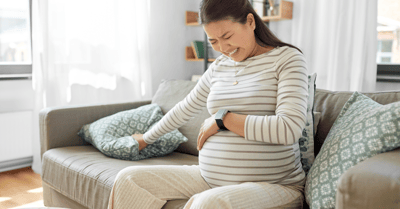Is This Pain Normal? An Expert’s Guide to Pregnancy Aches
Throughout pregnancy, your body undergoes significant changes to support your growing baby, and it's common to experience aches and discomfort along the way. In many cases, these sensations are perfectly normal. However, when pain is severe, persistent, or accompanied by other concerning symptoms, it may indicate a more serious underlying issue that requires prompt medical attention. In such cases, an urgent hospital referral may be necessary—unless a benign cause can be confidently identified with no signs of maternal or foetal distress.
So, how can you tell the difference between normal abdominal discomfort and pain that warrants medical attention? Let’s begin by exploring the common causes of abdominal pain during pregnancy.
What Causes Abdominal Pain in Pregnancy?
Abdominal pain during pregnancy is often caused by harmless issues such as muscle strain from a growing uterus, constipation, or gas. Naturally, many expectant mothers worry that such pain could signal premature labour or complications with the pregnancy. While these are valid concerns, it’s important to remember that not all abdominal pain is pregnancy-related—some may stem from unrelated medical conditions that still require attention.
In early pregnancy, the possibility of an ectopic pregnancy should always be ruled out before attributing pain to other causes. Obstetric-related conditions that can cause abdominal pain include preterm labour, placental complications (such as abruption or infection), uterine rupture, and liver-related disorders. Fortunately, these serious conditions are relatively rare, and most pregnancies progress without complications.

Diagnosing non-obstetric causes of abdominal pain in pregnant women can be more challenging due to the displacement of abdominal organs by the growing uterus, which can obscure classic clinical signs. For instance, appendicitis—one of the most common surgical emergencies during pregnancy—may present differently as the appendix shifts upward with the enlarging uterus. Although right lower abdominal pain remains the most common symptom, in the third trimester (after 24 weeks), the pain may localise to the mid or upper right abdomen.
Other possible causes include colicky pain from constipation or discomfort from a urinary tract infection. However, more serious conditions such as symphysis pubis diastasis—a painful condition affecting the pelvic joint—or surgical emergencies like appendicitis, gallbladder inflammation, or complications from ovarian cysts (e.g. rupture, torsion, or bleeding) must also be considered. These are often accompanied by fever or abnormal findings on blood tests.
In unclear or emergency cases, a multidisciplinary approach is often necessary. This may involve joint assessment by obstetricians, gynaecologists, and general surgeons. When the diagnosis remains uncertain, clinicians must carefully weigh the risks of surgical intervention against the potential consequences of delayed treatment, which could compromise both maternal and fetal well-being.
When Should You Seek Medical Attention?
Pregnant individuals should contact their obstetrician if abdominal pain persists despite a few minutes of rest, or if it is accompanied by any of the following symptoms:
- Vaginal bleeding
- Unusual vaginal discharge (in colour, consistency, or smell)
- Fever, chills, or rigors
- Nausea or vomiting
- Dizziness, lightheadedness, or fainting
- Burning sensation during urination
- Uterine hardening or contractions
- Reduced fetal movements
It’s also important to take into account the stage of pregnancy, as the causes and implications of abdominal pain may vary by trimester.
First Trimester
In early pregnancy, most abdominal discomfort is often benign—commonly caused by gas, constipation, stretching ligaments, urinary tract infections, or the presence of a large corpus luteum cyst (which typically resolves by 12 weeks). However, it is essential to rule out more serious conditions such as ectopic pregnancy in the presence of persistent or severe pain.
Second and Third Trimesters
As pregnancy progresses beyond 24 weeks, general aches and pelvic girdle pain become more common due to the expanding uterus. While this can cause significant discomfort, it is usually not dangerous and may benefit from support by a physiotherapist or chiropractor.
The main concern in later pregnancy is preterm labour, which typically presents as regular, painful uterine contractions—often described as a hardening of the entire uterus—sometimes accompanied by increased vaginal discharge or bleeding. This should be evaluated promptly.
You may also begin to notice Braxton Hicks contractions, or "practice contractions," which are characterised by infrequent, irregular, and usually painless tightening of the uterus. While these can be alarming, especially for first-time mothers, they are generally harmless. As long as they are not painful, there is no bleeding or abnormal discharge, and the baby is moving normally, there is usually no cause for concern.
How Does Your Obstetrician Investigate Abdominal Pain?
As the uterus expands during pregnancy, abdominal organs shift from their usual positions, which can make locating and diagnosing the source of pain more complex. Your obstetrician will first perform a thorough assessment of both you and your baby to determine if either is in immediate danger. This typically involves a physical examination, monitoring the baby’s heart rate, checking amniotic fluid levels, and assessing fetal growth and movements. If these parameters are normal and there are no signs of uterine contractions, preterm labour is unlikely. A vaginal examination may also be performed to check for cervical dilation.
If the pain is suspected to be surgical in nature—what doctors refer to as a “surgical abdomen”—there are specific signs to look out for. One key sign is rebound tenderness, where the pain worsens when pressure is released from the abdomen. Another is guarding, a reflex tightening of the abdominal muscles due to irritation or inflammation inside the abdominal cavity. These signs may indicate a more serious underlying condition. Depending on your symptoms and physical findings, your doctor may order blood tests and imaging to identify the source of pain. If your vital signs are unstable, immediate resuscitation and emergency surgery may be required to protect both maternal and fetal health.
.png?width=400&height=209&name=blog_%20Is%20This%20Pain%20Normal_%20An%20Expert%E2%80%99s%20Guide%20to%20Pregnancy%20Aches%20(2).png)
MRI is considered the safest modality, as it does not involve radiation and provides a clear view of abdominal structures that may be obscured by the enlarged uterus.
When imaging is needed during pregnancy, MRI is considered the safest modality, as it does not involve radiation and provides a clear view of abdominal structures that may be obscured by the enlarged uterus. While ultrasound is often used initially, it may have limitations in later pregnancy. CT scans are generally avoided unless necessary due to radiation exposure. If surgery is required, it is typically safest when performed after the first trimester (beyond 12 weeks' gestation), and many women go on to have healthy, full-term pregnancies following successful treatment of surgical emergencies.
What You Need to Know
When it comes to pregnancy, it’s always better to err on the side of caution. If you’re unsure about any abdominal pain, visit the nearest maternity hospital so your obstetrician can assess and determine the underlying cause. Seek medical attention if your abdominal pain—no matter how mild—persists for more than 10–15 minutes despite rest. Immediate evaluation is especially important if the pain is:
- Increasing in intensity
- Severe enough to wake you from sleep
- Accompanied by fever, vaginal bleeding or discharge
- Associated with fainting, uterine hardening, or reduced fetal movements
The reassuring news is that most abdominal pains during pregnancy are due to harmless or easily manageable conditions. Even in serious non-obstetric surgical emergencies, many women have undergone successful treatment and gone on to carry their pregnancies to full term. Ultimately, the mother’s well-being is critical, and timely medical care can help ensure the best outcome for both mother and baby. When advanced imaging is needed, MRI is the safest option for pregnant women and is typically reserved for complex cases where surgery may be required. Concerned about abdominal pain during pregnancy? Book a consultation with Dr Sivahami Sivananthan, Obstetrician & Gynaecologist at Astra Women’s Specialists (Core Clinic i12 Katong) today for expert and compassionate care.
Featured Contributor:

Astra Women's Specialists
Dr Sivahami
Obstetrician and Gynaecologist
Astra Women's Specialists is part of the Women’s Health arm of Singapore Medical Group (SMG), with a network of Obstetrics & Gynaecology clinics and a Breast Care Centre, helmed by specialists dedicated to women’s health and wellness.
They believe specialist care should be easily accessible, with their clinics ideally located in the heartlands. Their range of services includes:
- Pregnancy
- Gynaecology
- Fertility
- Birth Control
- Laparoscopic Surgery
They are dedicated to seeing you through your health and wellness journey at every stage of life, by providing accurate content you can trust and connecting you to a comprehensive range of women’s health services.
Connect with Astra Women's Specialists on their Website, Instagram, and Facebook.